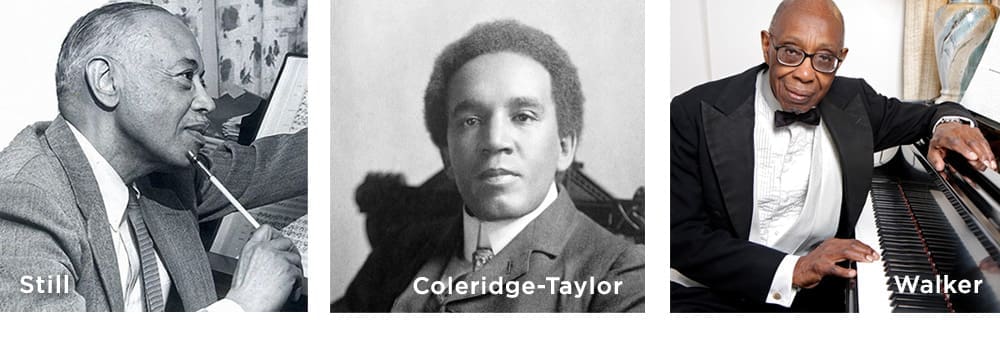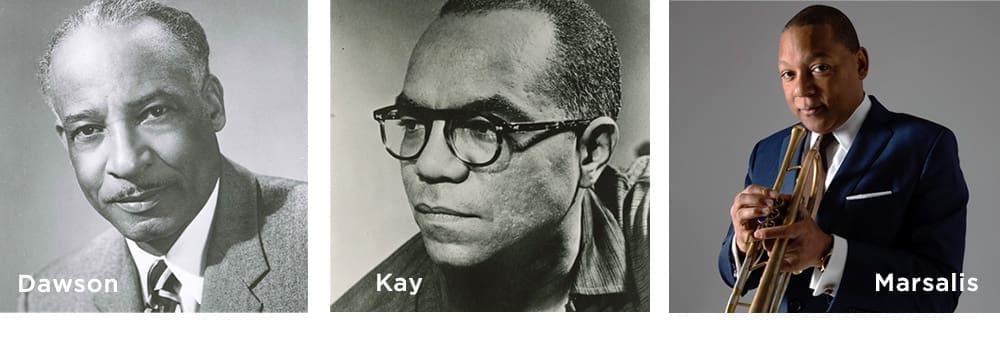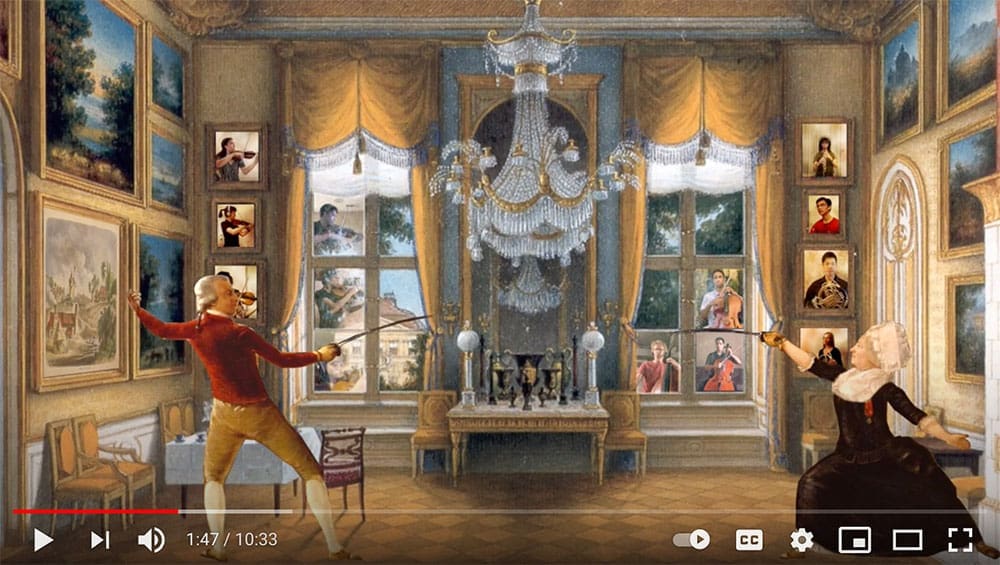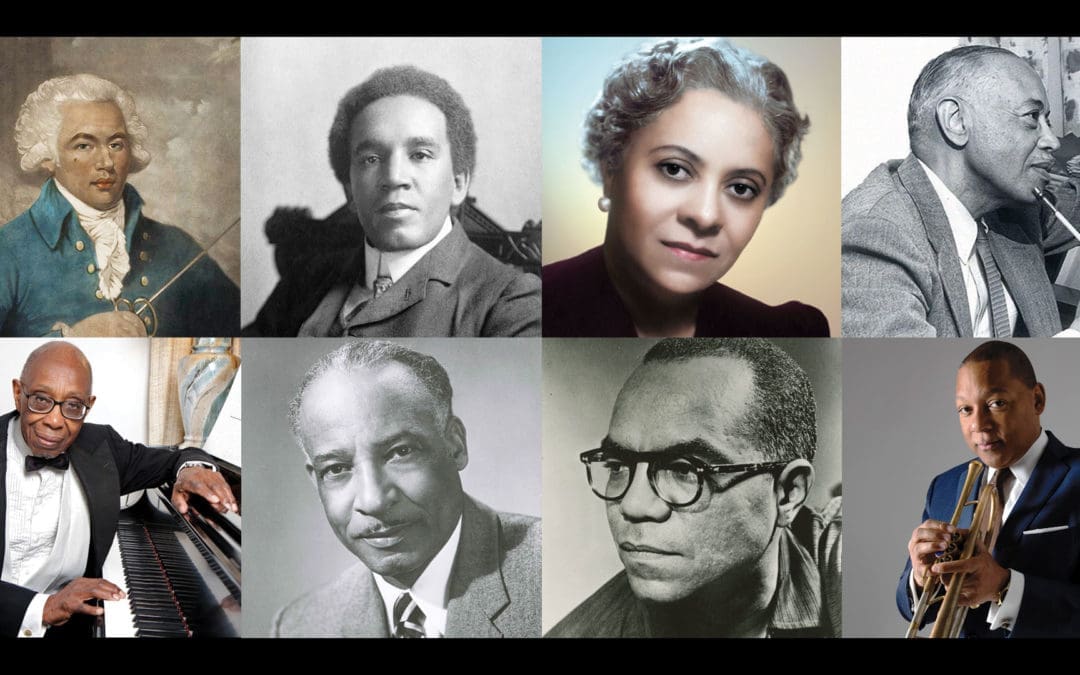Today we celebrate Martin Luther King Jr. Day with a spotlight on Black and African-American composers of classical music. Madison Symphony Orchestra Music Director John DeMain shares reflections and discoveries.
Diversity — Black and African-American classical music composers.
As we celebrate Martin Luther King Day and Black History month, I thought I would share with you some of the discoveries I’ve made in the past year and a half focusing on African-American composers and their contribution to classical music. The results have been startling to me. In my classical music education from studying the piano as a child through my degree earning education at the Juilliard School, diversity was certainly not a significant part of my heightening musical awareness, as I prepared for a career in classical music. Sure, we were aware of William Grant Still, and we all fell in love with the Scott Joplin rags, and, of course, jazz greats like Duke Ellington, but it pretty much ended there.
The recent exploration and recommitment to diversity has unleashed a treasure trove of often neglected Black and African-American composers of classical music who have contributed much throughout history. I would like to recommend a series of pieces for you to listen to on YouTube that will illustrate this point, and hopefully, pique your interest to hear compositions of these composers in live performance with the Madison Symphony in future seasons.

I’d like to begin with Joseph Bologne Chevalier, de Saint-Georges, who was a contemporary of Mozart and thought to be the first composer of classical music of African heritage. YouTube has quite a collection of his music. You will hear why he became known as the Black Mozart. Next, we’ve been hearing so much about Florence Price who was the first African-American woman to have her music performed by a major symphony orchestra, namely, the Chicago Symphony. Check our her symphonies and string quartets on YouTube. You will be thoroughly delighted.

Added to your must listening is the Afro-American Symphony No. 1 by the Dean of African-American composers — William Grant Still. Follow this with Samuel Coleridge-Taylor’s Hiawatha Overture. If you haven’t heard George Walker’s “Lyric for Strings” which we planned to play for you this past season, and will program it again next season, I urge you to enjoy this piece of great beauty and solace particularly during these times. Walker was the first African-American to win a Pulitzer Prize for music for his composition Lilacs in 1996.

Check out orchestral works by William Dawson, and Ulysses Kay again for some wonderful listening pleasure. And finally, in our own time, go on YouTube and hear the amazing Violin Concerto in D Major by Wynton Marsalis and recorded by Nicola Benedetti. This is such a fabulous piece that I want to present it at the earliest possible opportunity. These discoveries are, by me, long overdue, but totally joyous, nevertheless. As I said before, we will be bringing you a much more diverse repertoire in the very near future, but to titillate your interest, investigate and listen to these history making African-American musicians immediately. You will be amazed at what you discover.

– John DeMain
Music Director, Madison Symphony Orchestra
Joseph Bologne, Chevalier de Saint-Georges: Symphony No. 2 in D Major
Student Symphony Orchestra of USC
This fresh new virtual performance premiered on October 3, 2020, featuring Animation by Oscar Li.

Florence Price – Adoration
Augustin Hadelich
July 8, 2020
(arranged by Elaine Fine)
One of our MSO guest artists, Violinist Augustine Hadelich, gathered 37 musicians to capture this performance last summer! This is an exciting new way to experience the music of Florence Price. Musicians includedGeneva Lewis, Patricia Cole, Akemi Takayama, Arun Asthagiri, Giuseppe Mengoli, Wei-Chung Chen, Karen Silva, Sharon Kwee, Nadia Ettinger, Joyce Kwak, Ana Sofia Rodrigues, Cheryl Gaudiano, Trent Ransom, Celina Bethoux, You-Jung Han, Malhar Kute, Mai Matsumoto, Savion Washington, Alberta Douglas, Jana Kaiser-Döge, Rachel Ginebra (guitar), Bruce Goldstein, Emily Corbett, Emily Kalish, Ion Scripcaru, Gonzalo Beltran, Amy Wang-Hiller, Phoebe Liu, Antoniu-Theodor Andreescu, Emilia Wagner, Natalie Wong, Sofia Nikas (viola), Raquel Pascual Peña, Selah Kwak, Mark Miller, Juan Luis Sosa, Bassam Nashawati.
LA Phil’s SOUND/STAGE: William Grant Still’s “Sorrow”
October 13, 2020
In 1931, William Grant Still’s Symphony No. 1, “Afro-American” became the first symphony by a Black composer performed by a major U.S. orchestra, and Still conducted the piece at the Hollywood Bowl with the Los Angeles Philharmonic in 1936. The version of the second movement heard in SOUND/STAGE conducted by Gustavo Dudamel makes use of a smaller-than-usual ensemble with orchestration approved by Still’s daughter, Judith Anne Still.
George Walker “Lyric for Strings”
Performance by A Far Cry
November 1, 2019
George Walker’s “Lyric for Strings” was originally titled “Lament” at its premiere in 1946. It is dedicated to the memory of his grandmother, Malvina King, who had related stories to him about her experience as a slave. From A Far Cry’s performance of “American Noir” on Nov 1, 2019. A Far Cry performs a set of pieces by American composers that commemorate both private and public death. The four pieces in this set were written between 1935 and 1960 by people whose lives were threatened by racism, bigotry, and persecution.
Wynton Marsalis Violin Concerto
Violinist Nicola Benedetti performs the solo cadenza
Dallas Symphony Orchestra
October 1, 2018, Meyerson Symphony Center – Dallas, TX
Nicola Benedetti describes her experience of playing Wynton Marsalis’s jazz-inspired Violin Concerto, before performing the solo cadenza.

